In the relentless pursuit of achieving Net Zero emissions, the global community recognizes that addressing the single most critical contributor to climate change is paramount – coal.
As conversations about net zero reverberate during the 28th Conference of Parties (COP28), the focus is undeniably centered on the urgent need to confront the coal challenge. Accounting for a staggering 40% of emissions, coal emerges as the linchpin in the battle against climate change, demanding meticulous attention and strategic solutions.

On the grand stage of limiting the planet’s long-term average temperature to below the 1.5-degree threshold, the Philippines was given the spotlight by COP28. ACEN shared their pioneering sustainable initiatives during the Main Event titled “Accelerating the Managed and Just Phasedown of Coal” held at the Al Waha Theatre, COP Presidency main stage.
The panel discussion was joined by key figures in the energy sector, gathering to discuss Asia’s transition from coal to cleaner alternatives. Elizabeth Yee, Executive Vice President of Programs at the Rockefeller Foundation, led the conversation, engaging with leaders such as Eric Francia (ACEN), Ravi Menon (Monetary Authority of Singapore), Darmawan Prasadjo (PLN), and Cleo Kawawaki (Asian Development Bank).

Yee kicked off the environmental discussion with the acknowledgment of Ayala Corporation’s energy subsidiary ACEN’s milestone of successfully developing the world’s first coal-to-clean project and leveraging through transition credits.
“Transition credits, and carbon markets are a critical part of this ecosystem. We are very grateful that the COP Presidency has put its weight behind this idea, and that we’re really providing a platform for actors across this ecosystem to make this a reality. Just yesterday, the Coal to Clean Credit Initiative (CCCI) methodology and team announced a new collaboration with other organizations. ACEN and the Monetary Authority of Singapore (MAS) are joined here today to explore a pilot project in the Philippines which we’re very excited about. If successful, this would be a first-of-its-kind project in the world,” said Yee.
ACEN’s bold shift to renewable energy

Eric Francia, President, and CEO of ACEN in response to the acknowledgment shared their company’s journey towards renewable energy. He highlighted ACEN’s commitment to achieving 100% renewable energy generation by 2025.
Francia emphasized the responsible divestment of coal plants, stating, “We closed the world’s first market-based Energy Transition Mechanism (ETM) a year ago, allowing us to retire a 246-megawatt coal plant by 2040.”
By transitioning from coal to cleaner technology by 2040, ACEN aims to cut 15-25 years’ worth of emissions, equivalent to up to 50 million metric tons of carbon dioxide (CO2). Moving forward to further accelerate and potentially retire the coal plants in the country earlier, Francia, like Yee, believes that Transition Credits (TCs) play a crucial role.
“Our ambition involves a combination of not only blended finance, but, as I cannot agree more with what has been said earlier, transition credits are a huge opportunity to unlock the potential of accelerating coal plants. We need to do it in a just manner, but, as you all know, we don’t run a charity; we run a sustainable enterprise,” stated Francia.

The announcement of ACEN joining forces with The Rockefeller Foundation’s Coal to Clean Credit Initiative (CCCI) and the Monetary Authority of Singapore (MAS) in the world’s biggest environmental climate change conference aims to advance efforts in hastening the retirement of coal plants in alignment with the Paris Agreement.
Supported by MAS’ Transition Credits Coalition (TRACTION), the initiative aligns with ACEN’s ambitious goals: 20GW of renewables by 2030, 100% renewable generation by 2025, and achieving net-zero GHG emissions by 2050 or earlier.
This achievement is not only perceived by other countries as a commitment to sustainable development but also a resolute response to the urgent need for transformative action. This year marks the first time that the Philippines has participated in the COP with its own pavilion and the first time it has taken the main stage to share a sustainable initiative, which is also a global first.
Ayala Corporation, ACEN’s parent company, has been actively pursuing net-zero goals since 2021. It stands out as the first conglomerate in the Philippines committing to achieving net-zero emissions by 2050. This commitment is realized through a three-pronged strategy: embracing renewable energy and transitioning from coal to cleaner technologies through Transition Credits and Just Energy Transition (ETM, TC, and JET). All these strides exemplify Ayala’s forward-thinking leadership, a journey that began at a time when investing in renewable energy wasn’t as widely embraced as it is today.
Putting a stop to coal – a must
Ravi Menon, Managing Director of the Monetary Authority of Singapore, couldn’t agree more with the need to phase out coal urgently, especially in Asia.
“The world is not going to get to net zero without phasing out coal in Asia. For every six tons of greenhouse gas emissions emitted in the world into the atmosphere. one ton, comes from a coal plant in Asia,” said Menon.
A neighbor of the Philippines, Singapore also believes that TCs are the keys to the success of diminishing the world’s biggest emission contributor – coal.

Coal is detrimental to the environment for several reasons. Its combustion releases substantial amounts of greenhouse gases, such as carbon dioxide, contributing significantly to climate change. This contributes to rising temperatures causing ice caps to melt faster than they should be, leading to rising water levels and submerging coastal areas, making Singapore and the Philippines among the most vulnerable in the world. Additionally, coal burning emits pollutants like sulfur dioxide and nitrogen oxides, causing air pollution. Coal contains toxic substances like mercury and arsenic, leading to environmental contamination. The mining process disrupts landscapes, contributing to deforestation, habitat destruction, and soil erosion. Furthermore, coal combustion generates large amounts of ash, posing a risk of groundwater pollution. The negative impacts on human health, including respiratory and cardiovascular issues, further underscore the environmental hazards associated with coal use. And if the world wants to mitigate coal, shifting towards cleaner and more sustainable energy sources is a must.
Menon, agreeing to Francia, underscored the beauty of blended finance and transition credits, stating, “You cannot phase out coal in Asia without blended finance and transition credits; it’s essential to bring down the cost of capital and address the economics of compensating coal owner.
The battle has just begun
Aiming for the same goal, Darmawan Prasadjo, CEO of PLN, outlined Indonesia’s ambitious decarbonization plans, including the early retirement of coal-fired power plants.
“The electricity sector in Indonesia is roughly 260 million metric tons. We leave it alone business as usual, is going to increase to 1 billion metric tons by 2060. But we’re not going to let this happen,” said Prasadjo.
He believes that having a renewable innovation like the ETM and the use of transition credits seals the deal in eliminating the use of coal.
He stated, “We redesigned our national electricity planning, removing coal from the equation, and launched a net-zero emission target by 2060. Our self-imposed carbon rating and energy transition mechanisms demonstrate our commitment to a sustainable future.”

Arming these countries mentioned in the battle against coal is the Asian Development Bank (ADB). ADB served as a bridge, allowing these countries to kickstart their sustainable initiatives, including that of the Philippines.
In fact, when the Philippines was given the spotlight at COP28, ACEN’s Francia said, “The eureka moment for us was when ADB was pushing for this concept of ETM, which was not so familiar to us. We said that this could be done in a market based driven by the private sector so that we can move faster and that’s what we did.”
The eureka moment for us was when ADB was pushing for this concept of ETM, which was not so familiar to us. We said that this could be done in a market based driven by the private sector so that we can move faster and that’s what we did.
Cleo Kawawaki from the Asian Development Bank shared their enthusiasm to partner with the Philippines, stating, “I’m really glad to announce that we have the mandate for Philippine Mindanao coal… This one we believe is going to be fast-tracked.”

She also stressed the need for a vibrant transition credit market, stating, “We must stretch philanthropic donor money to make the market more stable. ADB aims to play a crucial role in ensuring high-quality credits and developing a market that supports coal phase-out.”
Elizabeth Yee, wrapping up the discussion, expressed gratitude for the collaborative efforts of the panelists. She remarked, “It’s heartening to witness the commitment and ambition of these leaders in combating climate change. The collaboration between organizations, governments, and financial institutions, as seen in initiatives like ETMs and transition credits, marks a significant step towards a sustainable and greener future for Asia.”
As the curtains close on COP28’s Energy Transition-themed day, the spotlight on the Philippines’ groundbreaking sustainable initiatives, especially the innovative coal-to-clean mechanism, continues to resonate. Evidently, in the escalating battle against coal, the Philippines emerges as a vanguard, leading the charge for a sustainable and greener tomorrow. The call has been sounded, and the Philippines proudly takes its place at the forefront of this transformative journey.





